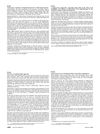 18 citations,
July 2011 in “Journal of The American Academy of Dermatology”
18 citations,
July 2011 in “Journal of The American Academy of Dermatology” Familial factors affect hair loss types in Koreans, with M type in men, L type in women, and paternal factors influencing male hair loss more.
 3 citations,
January 2019 in “Jikken doubutsu ihou/Jikken doubutsu/Experimental animals/Jikken Dobutsu”
3 citations,
January 2019 in “Jikken doubutsu ihou/Jikken doubutsu/Experimental animals/Jikken Dobutsu” Pigs without the Hairless gene showed skin and thymus changes, useful for studying human hair disorders.
[object Object]  50 citations,
December 1998 in “Dermatologic Surgery”
50 citations,
December 1998 in “Dermatologic Surgery” Hair loss is more common in men aged 18-49 and increases with age.
 January 2023 in “Advances in reproductive sciences”
January 2023 in “Advances in reproductive sciences” Higher levels of the protein Pannexin-1 may play a role in hair loss in women with PCOS.
 1 citations,
May 2016 in “Current Opinion in Pediatrics”
1 citations,
May 2016 in “Current Opinion in Pediatrics” Children's hair loss can be caused by various factors and should be treated with appropriate, age-specific methods and psychological support.
January 1998 in “Dermatologic Surgery”  35 citations,
January 2014 in “Postepy Dermatologii I Alergologii”
35 citations,
January 2014 in “Postepy Dermatologii I Alergologii” DHT's role in hair loss is important, but measuring its level for diagnosis is questionable.
 June 2023 in “Facial Plastic Surgery Clinics of North America”
June 2023 in “Facial Plastic Surgery Clinics of North America” Hair transplantation is important for transgender patients to enhance their masculine or feminine appearance.
 4 citations,
December 2020 in “Mammalian genome”
4 citations,
December 2020 in “Mammalian genome” Harlequin mutant mice have hair loss due to low AIF protein levels and retroviral element activity.
 101 citations,
January 2016 in “Journal of Cutaneous and Aesthetic Surgery”
101 citations,
January 2016 in “Journal of Cutaneous and Aesthetic Surgery” Different types of hair loss need specific treatments, and while many classification systems exist, each has its flaws; more research is needed to refine these systems and treatments.
 August 2016 in “Journal of Investigative Dermatology”
August 2016 in “Journal of Investigative Dermatology” Scalp psoriasis features reversible hair loss and specific immune activation, with no significant hair follicle damage.
 82 citations,
August 2017 in “Cell Reports”
82 citations,
August 2017 in “Cell Reports” An imbalanced gut and lack of biotin can cause hair loss in mice.
 1 citations,
January 2017 in “Current Dermatology Reports”
1 citations,
January 2017 in “Current Dermatology Reports” Early baldness in men may indicate risks for obesity, metabolic syndrome, insulin resistance, and heart disease, similar to women with PCOS. Alopecia areata is often linked with autoimmune diseases and mental health issues. Certain hair disorders are due to genetic issues, and chemotherapy can cause hair loss through specific biological pathways. Iron deficiency's link to hair loss is still disputed.
 11 citations,
May 2009 in “Medical Hypotheses”
11 citations,
May 2009 in “Medical Hypotheses” Male pattern baldness is an unintended side effect of the body's use of androgens for muscle growth, especially in those genetically prone to it.
 2 citations,
October 2017 in “Journal of The American Academy of Dermatology”
2 citations,
October 2017 in “Journal of The American Academy of Dermatology” Focal atrichia helps diagnose female pattern hair loss.
 1 citations,
January 2023 in “Journal of Clinical Medicine”
1 citations,
January 2023 in “Journal of Clinical Medicine” A new hair restoration technology was found to effectively increase hair thickness, density, and growth, while reducing hair loss and improving scalp health, with no side effects.
 3 citations,
March 2021 in “Clinical, Cosmetic and Investigational Dermatology”
3 citations,
March 2021 in “Clinical, Cosmetic and Investigational Dermatology” Early treatment of Lupus Erythematosus Alopecia can prevent permanent hair loss, and various medications are effective.
 July 2023 in “Biomolecules”
July 2023 in “Biomolecules” The circadian clock plays a key role in hair growth and its disruption can affect hair regeneration.
 30 citations,
November 2018 in “EMBO Reports”
30 citations,
November 2018 in “EMBO Reports” The Ovol2-Zeb1 circuit is crucial for skin healing and hair growth by guiding cell movement and growth.
 2 citations,
January 2019
2 citations,
January 2019 The document concludes that autoimmune skin disorders are treated with corticosteroids and immunosuppressive drugs.
 May 2015 in “Hair transplant forum international”
May 2015 in “Hair transplant forum international” Androgenetic alopecia causes hair loss by shrinking hair follicles due to androgens, with the connection between the muscle and hair follicle determining if the loss is reversible.
[object Object]  1 citations,
October 2000 in “Pediatrics in Review”
1 citations,
October 2000 in “Pediatrics in Review” The document says that hookworms are treated with mebendazole and stress-related hair loss usually gets better in 6 months, while other hair loss types have specific treatments.
 2 citations,
January 2008 in “Journal of The American Academy of Dermatology”
2 citations,
January 2008 in “Journal of The American Academy of Dermatology” Trichoscopy is a helpful and quick method to diagnose hair loss without shaving.
 20 citations,
July 2000 in “PubMed”
20 citations,
July 2000 in “PubMed” The document outlines a method for diagnosing hair loss and suggests specific treatments based on the diagnosis.
 19 citations,
May 2013 in “Annals of Oncology”
19 citations,
May 2013 in “Annals of Oncology” Aromatase inhibitors cause male pattern hair loss in women.
 September 2023 in “Frontiers in medicine”
September 2023 in “Frontiers in medicine” The mTOR signaling pathway is crucial for hair health and targeting it may lead to new hair loss treatments.
5 citations,
September 2021 in “Clinical case reports” GLPLS is a rare skin condition with specific hair loss and skin symptoms.
 11 citations,
June 2020 in “Dermatologic Therapy”
11 citations,
June 2020 in “Dermatologic Therapy” PRP treatment improves hair density and diameter in women with androgenetic alopecia.
 18 citations,
May 2017 in “Experimental Dermatology”
18 citations,
May 2017 in “Experimental Dermatology” AMT may cause hair loss and changing dWAT activity could help treat it.
 40 citations,
August 2006 in “Current Drug Safety”
40 citations,
August 2006 in “Current Drug Safety” Some drugs can cause hair loss, excessive growth, or color changes, often reversible but sometimes permanent.



























